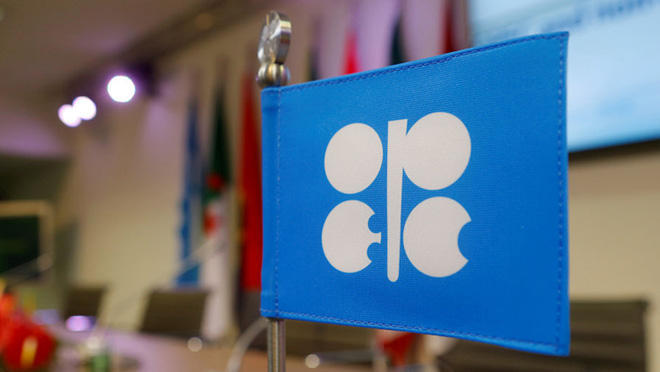Azerbaijan reports on implementation of OPEC+ deal for November

By Leman Mammadova
Azerbaijan presented data on its daily oil production in November 2018 to the OPEC Joint Technical Committee as part of the Vienna Agreement, Trend reports citing the Azerbaijani Energy Ministry.
Daily oil production stood at 801,000 barrels in November 2018, of which 733,000 barrels accounted for crude oil and 68,000 barrels for condensate, while 6,000 barrels of oil products were exported.
In January 2018, daily oil production stood at 814,600 barrels, in February 2018 – at 806,000 barrels, in March – 794,000 barrels, in April – 785,700 barrels, in May – 801,000 barrels, in June – 792,000 barrels, in July – 773,000 barrels, in August – 774,000 barrels, In September – 796,000 barrels and in October – 783,000 barrels of oil per day.
OPEC Joint Technical Committee was created on Jan. 22, 2017 to monitor the implementation of countries' commitment to cut oil production.
Major oil producers have reached a deal to reduce oil production by 1.2 million barrels per day at the 5th meeting of OPEC and non-OPEC ministers held in Vienna on December 7.
It has been agreed to reduce daily oil production by 800,000 barrels per day for OPEC countries in the first six months of 2019. Non-OPEC countries have agreed to reduce oil production by 400,000 barrels a day.
The agreement will enter into force on January 1, 2019. The next meeting of OPEC and non-OPEC format will be held in Vienna in April next year to revise the agreement.
Azerbaijan was represented by Energy Minister Parviz Shahbazov at the meeting. Azerbaijan also supported the decision to reduce oil production and joined the agreement to support the process of world oil market regulation.
The decision to reduce oil production, taken at the end of the OPEC+ meeting, is an important step for the development of the oil market and the oil industry, said Shahbazov, commenting on the decision of the cartel.
He appreciated the decision of the OPEC + countries to regulate the oil market and stabilize the oil prices.
“In recent years, due to the political and economic factors, the price of oil has dropped, and the process has been continuing. The over-consumption of production in the market and predicting the decline in the world economy for the next year would have helped to reduce oil prices. Only the OPEC + countries could support the oil market. Today's decision is a very important step for the oil producers, the oil market and the future of the oil industry,” he said.
Azerbaijan has pledged to cut production by 20,000 barrels per day. Thus, if the daily oil production in October was 783,000 barrels, from next year Azerbaijan will maintain this figure at 763,000.
Saudi Arabia will be the country to witness the most significant drop in oil production among OPEC member countries. Saudi Arabia is currently the world's largest oil exporter.
Russia is the second largest crude oil producer in the world after the United States. Its oil production level of 11.4 million barrels per day will be reduced by about 2 percent, to 228 thousand barrels.
Some countries have been applied a compromise within the framework of the agreement on reduction of oil production. Iran has been compromised as well as Libya and Venezuela, considering U.S. sanctions.
According to the OPEC's latest report, 15 countries represented in the organization produced approximately 33 million barrels of black gold (about a third of crude oil production worldwide) in October.
According to the International Energy Agency (IEA), the demand for crude oil produced by OPEC countries at the world market is currently at 31.3 million barrels.
OPEC and non-OPEC producers reached an agreement in December 2016 to curtail oil output jointly and ease a global glut after more than two years of low prices. OPEC agreed to slash the output by 1.2 million barrels per day from January 1.
Non-OPEC oil producers such as Azerbaijan, Bahrain, Brunei, Equatorial Guinea, Kazakhstan, Malaysia, Mexico, Oman, Russia, Sudan, and South Sudan agreed to reduce output by 558,000 barrels per day starting from January 1, 2017.
OPEC and its partners decided to extend its production cuts till the end of 2018 in Vienna on November 30, as the oil cartel and its allies step up their attempt to end a three-year supply glut that has savaged crude prices and the global energy industry.
Here we are to serve you with news right now. It does not cost much, but worth your attention.
Choose to support open, independent, quality journalism and subscribe on a monthly basis.
By subscribing to our online newspaper, you can have full digital access to all news, analysis, and much more.
You can also follow AzerNEWS on Twitter @AzerNewsAz or Facebook @AzerNewsNewspaper
Thank you!
